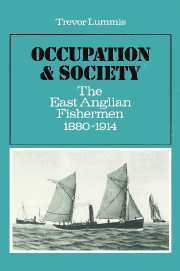Book contents
- Frontmatter
- Contents
- List of figures and tables
- Acknowledgements
- Map
- Introduction
- PART ONE OCCUPATIONAL STRUCTURE
- PART TWO THE SOCIAL STRUCTURE
- 5 The concept of community
- 6 The social structure of ownership
- 7 Images of social structure
- 8 Political attitudes
- PART THREE THE FAMILY, SOCIAL PRACTICE AND BELIEF
- Appendix: supplementary information on the interviews
- Glossary
- Notes
- Bibliography and sources
- Index
8 - Political attitudes
Published online by Cambridge University Press: 22 October 2009
- Frontmatter
- Contents
- List of figures and tables
- Acknowledgements
- Map
- Introduction
- PART ONE OCCUPATIONAL STRUCTURE
- PART TWO THE SOCIAL STRUCTURE
- 5 The concept of community
- 6 The social structure of ownership
- 7 Images of social structure
- 8 Political attitudes
- PART THREE THE FAMILY, SOCIAL PRACTICE AND BELIEF
- Appendix: supplementary information on the interviews
- Glossary
- Notes
- Bibliography and sources
- Index
Summary
… for elections held after the passing of the Ballot Act in 1872, we cannot make precise correlations between the electoral behaviour of small localities and the appropriate statistics of personal income, occupation, religious affiliation and so on …
H. Pelling 1967In spite of the difficulties noted above Pelling typifies the ‘marine population of the little coastal ports’ of Essex as mainly Conservative, thus going against the grain of the Liberal tendency in the area. This was true also of the Suffolk and Norfolk inshoremen. He states that the deepsea fishermen of Lowestoft and Yarmouth were split, with the trawlermen being Conservative and the driftermen Liberal over the issue of Free Trade. The aggregated interview data largely supports this description. Pelling's complaint about the difficulties created by the 1872 Ballot Act was made before the widespread collection of oral history interviews. These now provide a potential source of correlations which are known to exist because income, occupation and so forth are united, not by statistical inference, but through the coherence of personal experience. As the informants were resident in eight different constituencies it would require many more of them, even if space permitted, to contribute to understanding the political history of the region. Our main interest is not which party held power but how the political values of individuals are related to their industrial and social position.
The interviews contain a substantial amount of information on the politics of farm workers as well as of fishermen.
- Type
- Chapter
- Information
- Occupation and SocietyThe East Anglian Fishermen 1880-1914, pp. 107 - 116Publisher: Cambridge University PressPrint publication year: 1985



